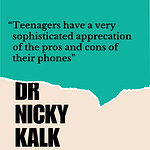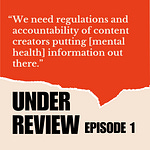It’s October, which means, our first live event is just weeks away! Very excited (only a little bit terrified). Thank you to everyone who has signed up! We have sold out of in-person tickets but we do have a waiting list - if you’d like to come along please sign up. We also have an online option, which will remain open. More info and tickets here.
Content warning: in this episode, we are discussing pregnancy. We use the terms 'women' and 'female' to discuss pregnancy-related topics, but we recognise that not all women will experience pregnancy, and not all who experience pregnancy identify as women.
In this month’s episode, we talked to Dr Laura Pritschet about what happens to the brain during pregnancy.
Around 140 million births take place each year, and 85% of women are likely to get pregnant when not taking contraception. This is a huge proportion of the population – but we know surprisingly little about what happens to the brain during pregnancy. Only 0.5% of neuroscience research is conducted on women’s health, let alone pregnant women’s health.
A new study scanned a first-time mother’s brain 26 times throughout her pregnancy – this study has really captured people’s attention: it has been featured in over 300 news articles at the time of recording, including in the New York Times, Fox News, the BBC, the list goes on.
Why has this study made such a splash and what have we learned about the brain?
Kathryn and Chloe Carrick (PhD student studying structural brain development) interviewed the lead author of the paper, Dr Laura Pritschet, to answer these important questions.
This is our first time covering a neuroscience topic! Make a coffee and settle in; Laura explains what brain changes mean, how the brain changes over the lifespan, and why we must understand brain changes in pregnancy. We’d love to hear your thoughts on this issue and whether you’d like to hear more about the brain in future episodes.
Resources and recommendations
The journal article discussed: Laura Pritschet and colleagues (2024), Neuroanatomical changes observed over the course of a human pregnancy, published in Nature Neuroscience
Bowers Women’s Brain Health Initiative: more info here
We also talked about adolescent brain development, here are some resources on this topic:
Help and support
If you are affected by any of the issues discussed in the episode, you can access free support via the following links:
Samaritans contact information: https://www.samaritans.org/how-we-can-help/contact-samaritan/
The Mix online chat and phone helplines for under 25s: https://www.themix.org.uk/get-support
Mind Charity contacts: https://www.mind.org.uk/information-support/for-children-and-young-people/useful-contacts/













Share this post